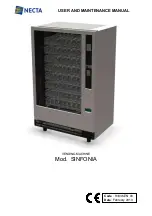
2
NAME OF PARTS
Back view
Presser foot lifter
Presser foot
Foot pedal input
Bobbin winder
tension disk
Bobbin winder pin
AC/DC input
Bobbin winder stop
Front view
Handwheel
Reverse button
Power off &
speed switch
Drawer
Take up lever
Upper thread
tension dial
Pattern
selection dial
Thread Cutter
Light
Needle clamp
screw
Bottom bobbin
7
8 STITCH FUNCTIONS
1. The sewing machine has a choice of 8 different stitch
types /lengths. To select the stitch you require, look
at the diagrams numbered 1-8 on the front of the
sewing machine, choose the corresponding number
on the dial is lined up with the arrow. For example, to
select zigzag stitch (diagram number 2), simply turn
the selector dial until the number 2 on the dial is lined
up with the arrow.
2. Proceed to sew.
3. When you wish to change stitch type, turn the hand wheel on the side
of the sewing machine to raise the needle to the highest point and set
the pattern selection dial to the desired stitch type in the same way as
above.
Caution:
When you wish to change stitch type, you must carry out step 3 first.
REVERSE STITCH BUTTON
Reverse sewing (back stitching) is useful for reinforcing the beginning
and end of seams. To use this function proceed as follows:
1. Sew forwards as normal, and then press and hold down the reverse
stitch button on the front of the sewing machine to sew backwards.
2. To sew forwards again simply release the reverse stitch button.
FEATURES
SETTING THE SEWING SPEED
This sewing machine has two sewing speeds.
Push the ‘OFF ’button, into the right, to the ‘H’ position
and the sewing speed will be increased, while in the ‘L’
position will reduce the speed.
WORK LIGHT
If additional light is needed, press the light switch to
turn the light ‘On’. Press the switch again to turn it ‘Off’.
SEWING SLEEVES
This sewing machine has been designed to sew
sleeves or any narrow openings in garment.
1. Lift the presser foot.
2. Position the garment over the sewing arm.
3. Lower the presser foot and follow the regular sewing
instructions.
























